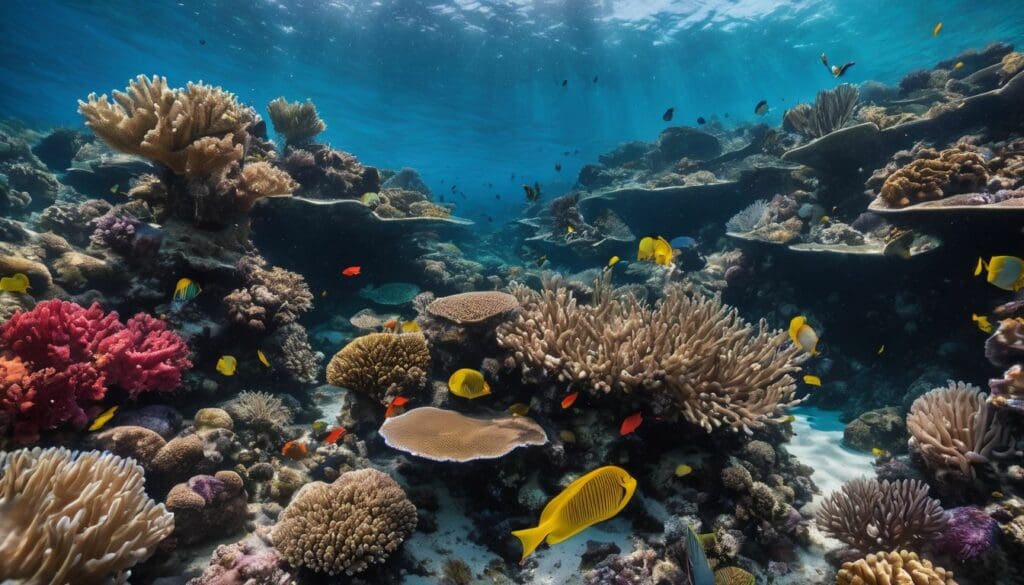As our planet warms, we all feel the heat, but it’s not just on land – our oceans are in turmoil too. Covering over 70% of Earth’s surface, these vast bodies of water absorb four times as much carbon dioxide as the Amazon rainforest.
Our blog post will reveal why this is a double-edged sword for climate control and what it means for us. Keep reading to dive into the deep end of ocean science!
Key Takeaways
- Oceans absorb over 90% of the excess heat from greenhouse gas emissions, crucially regulating Earth’s climate by acting as a thermal sponge.
- Climate change affects oceans by increasing temperatures and causing sea level rise and ocean acidification, which can disrupt weather patterns and lead to loss of marine biodiversity.
- To tackle the impact of global warming on oceans, actions such as reducing carbon emissions, conserving marine habitats, and adopting sustainable fishing are imperative.
- Rising sea levels resulting from melting ice caps and glaciers pose significant risks to coastal communities through flooding and erosion.
- Healthy oceans contribute significantly to food security, economic stability, and employment across various industries including fishing, shipping, and tourism.
The Ocean’s Vital Role in Climate Regulation
The ocean plays a crucial role in regulating the Earth’s climate by absorbing excess heat and energy, distributing heat and moisture around the globe, and driving weather systems. This vital function helps to maintain a stable and balanced global climate system.
Absorbing excess heat and energy
Oceans play a crucial role in absorbing the sun’s heat, acting as a giant thermal sponge. They take up over 90% of the additional warmth that greenhouse gases trap in our atmosphere, shielding land-dwellers from even more extreme temperature increases.
This vast heat absorption capacity helps to stabilise our climate and keeps global warming at bay.
Surface waters soak up solar radiation and, through ocean currents, distribute it deep into the abyss. Heat moves around the globe, affecting weather patterns and regulating temperatures far from where it was initially absorbed.
As oceans continue this vital function, they also prepare to perform their next act – distributing heat and moisture across our planet.
Distributing heat and moisture
After absorbing excess heat and energy, the oceans play a crucial role in distributing this thermal energy across the planet. This redistribution of heat and moisture helps regulate global climate patterns, influencing weather systems and rainfall distribution.
Ocean currents, driven by variations in temperature and salinity, act as conveyer belts carrying warm water from the equator towards the poles and cold water from the poles back to the tropics.
This process has a profound impact on weather patterns, shaping regional climates and affecting agricultural productivity.
In addition to transporting heat, oceanic circulation also plays a key role in moving moisture around the world. Evaporation from warm ocean surfaces leads to the formation of clouds which are then transported by winds over landmasses where they release precipitation.
As such, changes in ocean circulation due to global warming can have significant implications for rainfall patterns and may contribute to extreme weather events such as droughts or floods.
Driving weather systems
Oceans play a crucial role in driving weather systems across the globe. Warm ocean waters evaporate and contribute to the formation of clouds, which then release precipitation over land.
In addition to this, ocean currents also transport heat from the equator towards the poles, influencing wind patterns and weather systems. These processes have a direct impact on the climate and weather conditions that sustain life on Earth.
Furthermore, the temperature of ocean waters influences atmospheric circulation, affecting global weather patterns such as monsoons and hurricanes. Changes in ocean temperatures can lead to significant alterations in weather systems, impacting ecosystems and human societies worldwide.
Impact of Climate Change on Oceans
The impact of climate change on oceans includes increased ocean temperatures, sea level rise, and ocean acidification. These changes can lead to shifts in weather patterns and loss of marine biodiversity.
Increased ocean temperatures
Ocean temperatures are rising, affecting marine life. The warming water can disrupt the balance of ecosystems and cause migration of species to cooler areas. Ocean acidification is also a result of increased temperatures; it damages coral reefs and affects small marine organisms at the base of the food chain.
Fisheries worldwide are affected by ocean warming, impacting livelihoods and food supplies. Rising sea levels due to thermal expansion contribute to coastal erosion and threaten communities in low-lying areas.
Melting ice caps further exacerbate this issue, amplifying the urgency for mitigating climate change effects on our oceans.
Sea level rise
As global temperatures rise, the polar ice caps and glaciers melt, contributing to the increase in sea levels. This is a result of thermal expansion – when water warms up, it expands.
The rising sea levels have serious implications for coastal communities, as they are at risk of flooding and erosion. Low-lying areas are particularly vulnerable to these changes, which can lead to displacement of populations and loss of land.
Rising sea levels also pose threats to marine ecosystems by altering habitats and causing loss of biodiversity. Mangrove forests, coral reefs, and coastal wetlands are especially susceptible to inundation as a consequence of higher sea levels.
Ocean acidification
Ocean acidification occurs as the ocean absorbs excess carbon dioxide from the atmosphere. This CO2 reacts with seawater, decreasing its pH level. The impacts are profound, especially on marine life like corals, shellfish, and certain plankton species which struggle to build calcium carbonate shells or skeletons in acidic conditions.
These organisms play a crucial role in the marine food web, so their decline has widespread implications for ecosystems and economies reliant on them.
Furthermore, ocean acidification can disrupt the balance of marine chemistry that affects not only individual species but also entire ecosystems. It’s essential to address this issue by reducing carbon emissions and nurturing healthy marine environments through conservation efforts to mitigate further damage to our oceans.
Changes in weather patterns
Transitioning from ocean acidification to changes in weather patterns, it becomes evident that climate change is significantly impacting global weather systems. More frequent and intense storms, altered precipitation patterns, and shifting wind currents are some of the noticeable changes occurring worldwide.
These variations are attributed to the rising temperatures of both the atmosphere and oceans, profoundly influencing weather phenomena across the planet. As a result, it is crucial for individuals and communities to understand these shifts in weather patterns as they strive to support conservation efforts and sustainable environmental practices.
Loss of marine biodiversity
Transitioning from the impact of climate change on weather patterns, the loss of marine biodiversity is a significant concern. Rising ocean temperatures and acidification have led to the decline of vital habitats for marine species.
This has resulted in disrupted food chains, affecting not only the underwater ecosystem but also human livelihoods that depend on fishing and tourism.
Marine biodiversity loss can further exacerbate global warming as carbon sequestration by aquatic plants and animals diminishes. Additionally, reduced biodiversity weakens the ocean’s resilience to environmental changes, making it harder to regulate climate patterns effectively.
The Ocean’s Importance for Life on Earth
The ocean plays a crucial role in regulating the global climate, acting as a major carbon sink and providing essential resources for human life. Its contribution to food production, economies, and overall ecological balance cannot be overstated.
Carbon sink
Oceans play a crucial role as a carbon sink, absorbing and storing large amounts of carbon dioxide from the atmosphere. This process helps to mitigate the impacts of climate change by reducing the concentration of this greenhouse gas in the air.
Through phytoplankton and marine plants, oceans absorb carbon dioxide during photosynthesis, making them vital in regulating the Earth’s climate.
Not only do oceans act as a carbon sink, but they also help to maintain a balance in the global carbon cycle. The ability of oceans to sequester significant amounts of carbon not only benefits marine life but also contributes to stabilising our planet’s climate.
Regulating global climate
As a crucial carbon sink, the oceans play a vital role in regulating global climate. By absorbing and storing large amounts of carbon dioxide from the atmosphere, they help mitigate the impact of greenhouse gas emissions on Earth’s climate.
Additionally, through complex processes such as ocean circulation and nutrient cycling, they contribute to stabilising temperature patterns and weather systems across the planet.
Furthermore, with their ability to absorb heat and moisture and distribute it around the globe, the oceans help regulate global temperatures and support diverse ecosystems. This interconnected system highlights just how essential healthy oceans are to maintaining a stable climate for life on Earth.
Providing food and resources
Oceans play a crucial role in providing food and resources, supporting economies and sustaining communities around the world. They are a source of livelihood for millions, offering an abundance of fish and seafood that contribute to global food security.
Additionally, oceans also provide valuable resources such as energy, minerals, and pharmaceutical compounds, enhancing various industries. Furthermore, marine ecosystems support recreational activities like tourism and offer employment opportunities in sectors such as fishing and aquaculture.
Moreover, coastal areas depend on oceans for their economic prosperity through trade routes and transportation. The ocean’s vast resources are essential for feeding the growing global population while also contributing substantially to national economies worldwide.
Supporting economies and industries
Marine industries such as fishing, shipping, and tourism rely heavily on healthy oceans. A stable marine environment supports economies by providing livelihoods for millions of people worldwide.
Fishermen depend on sustainable ocean ecosystems to maintain their businesses and food supplies for communities globally.
Industries like shipping also benefit from a healthy marine environment. Open sea routes positively impact the global economy by facilitating trade between nations without bearing the cost of land-based transportation infrastructure.
Moreover, coastal tourism is an essential source of income for many countries and depends greatly on clean beaches and thriving marine life to attract visitors.
As climate change continues to affect oceans, it’s crucial to support industries dependent on them through sustainable practices and conservation efforts. This will help safeguard not only the health of our planet but also the economic stability that relies on thriving ocean ecosystems.
Ongoing Efforts to Address Climate Change in the Ocean
Efforts to address climate change in the ocean include reducing greenhouse gas emissions, implementing conservation and restoration of marine ecosystems, and promoting sustainable fishing practices.
These actions aim to mitigate the impact of global warming on the oceans and preserve marine life for future generations.
Reducing greenhouse gas emissions
To reduce greenhouse gas emissions, we can prioritise the use of renewable energy sources such as solar and wind power. Implementing energy-efficient practices in our daily lives, like using public transport or carpooling, also plays a vital role in reducing our carbon footprint.
Additionally, supporting policies that promote clean energy and sustainable practices can significantly contribute to decreasing greenhouse gas emissions on a larger scale.
As we continue to explore ways to address climate change in the ocean, it’s essential to focus on reducing greenhouse gas emissions. Taking proactive steps towards cleaner and more sustainable energy choices directly impacts our oceans’ health and resilience against global warming effects.
Conservation and restoration of marine ecosystems
Efforts to conserve and restore marine ecosystems play a crucial role in mitigating the impact of climate change on the oceans. Implementing protected areas, such as marine reserves and sanctuaries, helps to safeguard vital habitats for marine life.
Additionally, promoting sustainable fishing practices and reducing pollution can contribute to the preservation of ocean biodiversity.
Restoration projects focusing on mangroves, salt marshes, and coral reefs are essential for enhancing the resilience of coastal ecosystems against climate change impacts. These initiatives also aid in carbon sequestration and provide important buffers against rising sea levels and storm surges.
Sustainable fishing practices
Conservation and restoration of marine ecosystems are crucial, and sustainable fishing practices play a significant role in ensuring the health of oceanic environments. By using methods such as selective fishing gear, limiting catch quotas, and protecting essential habitats, we can minimise the negative impact on marine life while maintaining healthy fish populations for future generations.
Embracing sustainable fishing practices not only supports environmental conservation but also helps to secure livelihoods for those dependent on the oceans while safeguarding marine biodiversity for the long term.
Efforts towards sustainable fishing involve implementing measures like seasonal closures, establishing no-catch zones, and promoting responsible consumption habits to reduce overexploitation of fish stocks.
Conclusion
In conclusion, the oceans play a vital role in regulating our climate. They absorb excess heat and energy, distribute heat and moisture, and drive weather systems around the globe.
As we continue to address global warming, it’s crucial to consider the impact on our oceans and take steps to protect them for the health of our planet. By reducing greenhouse gas emissions, conserving marine ecosystems, and promoting sustainable fishing practices, we can work towards a healthier future for both our oceans and ourselves.
FAQs
1. What role do oceans play in global warming?
Oceans absorb heat from the air, which helps regulate our climate. But as the earth warms up, so do the oceans, contributing to global warming.
2. How does global warming cause sea levels to rise?
Global warming heats up ocean water, causing it to expand which contributes to a rise in global sea level.
3. Can rising sea levels affect people’s lives?
Yes! As sea levels go up due to melting ice and expanding seawater, coastal areas can flood more often and even lose land permanently.
4. Are humans responsible for changes in ocean temperatures and rising seas?
Human activities that release greenhouse gases are heating the atmosphere and oceans leading to significant changes including higher sea levels.





